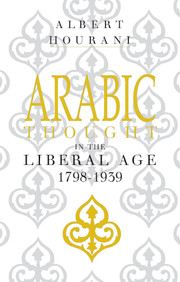Book contents
- Frontmatter
- Contents
- Preface to the 1983 reissue
- Note on Transliteration and References
- I THE ISLAMIC STATE
- II THE OTTOMAN EMPIRE
- III FIRST VIEWS OF EUROPE
- IV THE FIRST GENERATION: TAHTAWI, KHAYR AL-DIN, AND BUSTANI
- V JAMAL AL-DIN AL-AFGHANI
- VI MUHAMMAD ‘ABDUH
- VII ‘ABDUH'S EGYPTIAN DISCIPLES: ISLAM AND MODERN CIVILIZATION
- VIII EGYPTIAN NATIONALISM
- IX RASHID RIDA
- X CHRISTIAN SECULARISTS: SHUMAYYIL AND ANTUN
- XI ARAB NATIONALISM
- XII TAHA HUSAYN
- XIII EPILOGUE: PAST AND FUTURE
- Select Bibliography
- Index
- Frontmatter
- Contents
- Preface to the 1983 reissue
- Note on Transliteration and References
- I THE ISLAMIC STATE
- II THE OTTOMAN EMPIRE
- III FIRST VIEWS OF EUROPE
- IV THE FIRST GENERATION: TAHTAWI, KHAYR AL-DIN, AND BUSTANI
- V JAMAL AL-DIN AL-AFGHANI
- VI MUHAMMAD ‘ABDUH
- VII ‘ABDUH'S EGYPTIAN DISCIPLES: ISLAM AND MODERN CIVILIZATION
- VIII EGYPTIAN NATIONALISM
- IX RASHID RIDA
- X CHRISTIAN SECULARISTS: SHUMAYYIL AND ANTUN
- XI ARAB NATIONALISM
- XII TAHA HUSAYN
- XIII EPILOGUE: PAST AND FUTURE
- Select Bibliography
- Index
Summary
In Egypt and Syria, as elsewhere in Asia, the nationalism of the years between the First and Second World Wars had two sides. It aimed at throwing off the political domination of Europe, at least to the extent of replacing foreign by indigenous administrators, even if it was willing to concede to England or France control of foreign policy and the maintenance of military bases. At the same time however it willingly, for the most part, accepted the supremacy of European civilization; a voice like that of Gandhi was rare, and not much listened to outside India, and in spite of the backward glance of national romanticism, and a certain defensive pride, it was generally accepted that European civilization was the highest in the world. The case for national independence was stated in terms of European ideas: only if Egypt were self-governing would it be possible for her to become a ‘westernized’ nation in the full sense—that is to say, to create a liberal, democratic political system and accept willingly the values of European culture. To secure independence and make proper use of it, help was looked for from Europe: Mustafa Kamil hoped that in its own interest the French government would check the growth of British power, Zaghlul appealed to the liberal conscience of England. In a sense too the moral judgement of Europe was accepted: the new nations must prove themselves, they must show Europe that they could rule themselves.
- Type
- Chapter
- Information
- Arabic Thought in the Liberal Age 1798–1939 , pp. 324 - 340Publisher: Cambridge University PressPrint publication year: 1983



